The Ultimate Guide to Starting and Building Your Consulting Business
Strategies, Tactics, and Tools to
Help You Build a Thriving Consulting Business

What is Consulting?
Earnings, Lifestyle, and Satisfaction
Return to top: Ultimate Guide to Starting a Consulting Business
The business of consulting is straightforward – as a consultant, you use your expertise and experience to help others make decisions, solve problems, and sometimes implement the work.
Having been an independent consultant for 30+ years, I can say that in “most cases,” consulting is a lot of fun. It’s intellectually exciting and challenging, and when done right, it produces a great sense of contribution combined with high income and personal independence.
Most consultants find their career gives them a highly rewarding lifestyle, earnings, satisfaction, and contribution to the world. A consultant’s expertise, experience, and decisions are highly valued. It can be a very rewarding career.
Average consultants earn far more than their peers in industry and boast a higher job satisfaction rate as well. High earning consultants are off the charts in earnings and in job satisfaction rates.
This section of the Ultimate Guide will show you survey results that can help you decide if you want to become a consultant. There are many advantages to becoming a consultant. But if you do not build your business correctly, the disadvantages can be exhausting.
Key Takeaways
-
Consulting is a professional service where experts guide businesses and technology to achieve their goals through advice, knowledge, and solutions.
-
Consultants focus on clients' pain, problems, purpose, and profit goals.
-
The consulting industry offers varied services such as management, strategy, finance, IT, technology, science, and operations.
-
Successful independent consultants distinguish themselves with a Unique Value Proposition (UVP) that differentiates them from their competitors and meets a client's driving need.
-
Consultants differentiate themselves from freelancers by providing strategy, advice, and specialized knowledge. Consultants work for multiple clients with their own tools and under their own direction. Freelancers usually work for one client at a time, work under the client's directions, and often work at the client's location. You must know the difference between consulting and freelancing for branding, setting fees, and filing business taxes.
The Ultimate Guide to Starting, Building, and Scaling
Your Highly Successful Consulting Business
115-page eBook with tactics, tricks, and tips to
accelerate your consulting business growth!
How Much Do Consultants Make?
Getting a clear picture of what consultants earn is difficult because there is no precise tax or census definition of consultant that ties to their earnings. Consultant earnings depend greatly upon the clients they serve, their offering, and their marketing ability.
One method of calculating independent consulting income is to multiply the income of full-time consulting employee by a multiplier. A multiplier is used to account for an independent’s additional overhead, marketing time, taxes, and non-full-time status.
A second way to look at the range of consulting incomes is to look at US census data for solo professionals who categorize themselves in the categories that fit consulting. As you’ll see, there is a surprising income distribution for solo-professionals and consultants.
Comparing Corporate and Independent Consultant Incomes
You can find corporate consultant incomes for very specific niches by looking at online job boards. The online job boards give you a chance to see salary equivalents for very niche expertise and locations. (This can be handy later for project pricing.) However, don’t just assume an independent consultant earns the same as a corporate salary. Corporate salaries need to be adjusted upward for a full-time solo consultant.
The salary posted in job listings does not include benefits such as insurance, educational leave, and family leave. In 2019, US corporate benefits were approximately 30% of base salary.
A good Rule of Thumb is that a “full time, well-marketed” independent consultant charges 3 times as much as their salaried counterparts. However, that rate includes the consultant’s time with admin, overhead, and marketing.
The table below shows average consulting salary from the last week of January 2019 for average and senior job postings for all jobs including “consultant” in their title on the websites Glassdoor, PayScale, and Indeed. This table is for salaried employees and does not include bonuses, profit sharing, or salaries for senior consultants or partners.
Website Average Senior
Glassdoor $79,526 $95,469
PayScale $71,170 $93,176
Indeed $79,727 $95,440
Remember, a good rule of thumb is that independent consultants charge 2 to 3 times the salary of their full-time employee equivalent, but they must cover their own expenses and marketing.
Independent Professionals and Consultant Incomes
A second way of estimating income and distribution for consultants is to look at US Census data for solo professionals in those segments where consultants work.
This chart shows the income distribution for solo professionals from an analysis by Elaine Pofeldt of the last US Census data from 2015. This analysis is from Elaine’s book, The Million-Dollar, One-Person Business, published by Lorena Jones Books.
Like the high-end for salaried consultants, a lot of solo professionals make very high incomes. And these outliers have amazingly high incomes.
Even though this census data is dated and for the United States, it prompts an important question.
What do high-income independent consultants and professionals
do differently from the average?
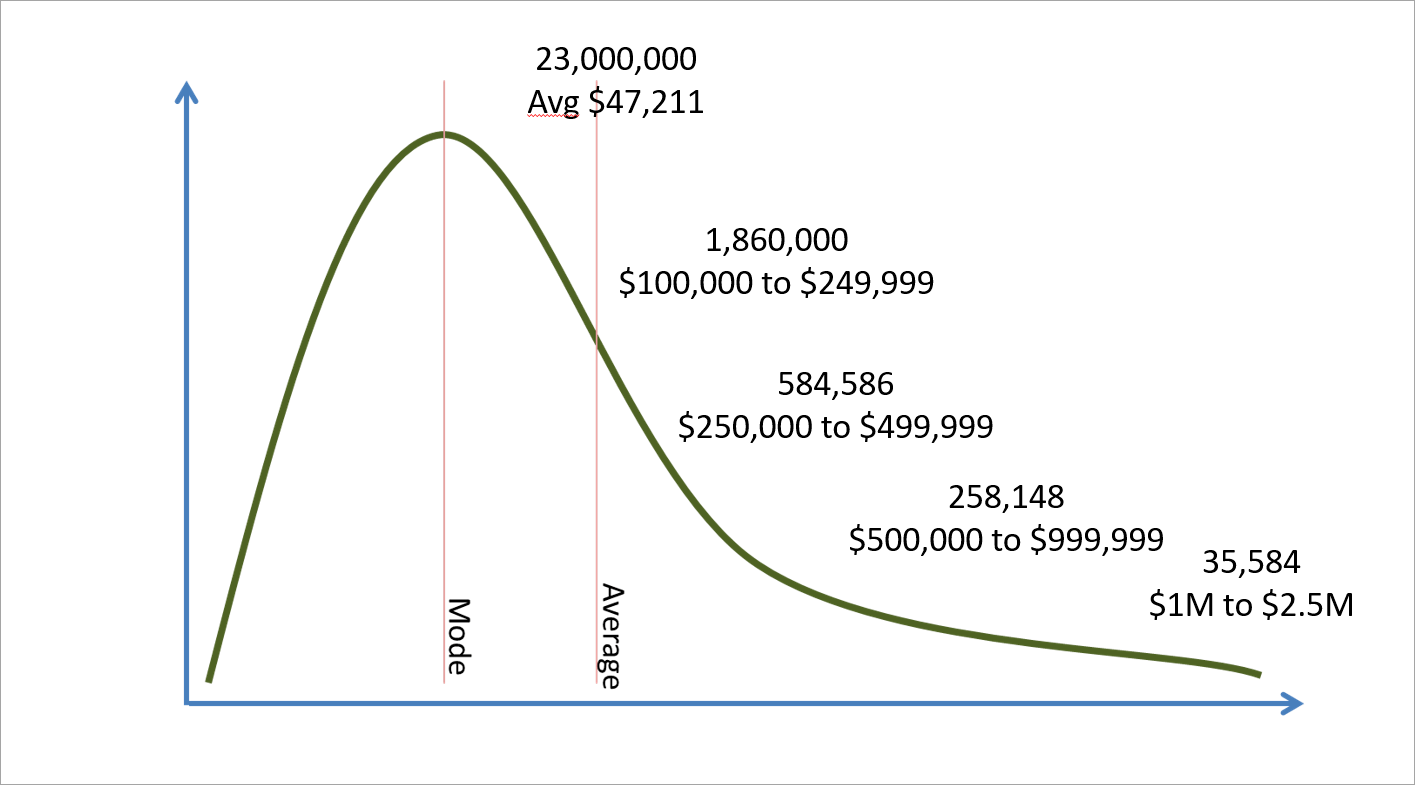
Totaling the long tail on the right of the curve shows that more than 2.7 million solopreneurs make more than $100,000 per year. There are more than that now since this data is from 2015.
There are almost one-million solopreneurs making more than $250,000 and 35,584 making between $1,000,000 and $2,500,000.
Even falling short of the top outliers still puts you in the high-six figures.
Following the business systems used by these high earners significantly improves your income and independence.
Implementing even a few of the simple business systems used by these high-earners significantly improves income and independence.
These are the strategies, systems, and skills we teach in Critical to Success.
While Elaine could not identify from the census categories the people who were consultants, she was able to see their industry categories. Four of the six categories fit the type of work and deliverables produced by consultants,
- Professional services and creatives
- Informational content creation
- Personal services firms
- Ecommerce (consultants selling productized value)
How Do Some Independent Professionals and Consultants Earn Such High Incomes?
How do some solo-consultants and solopreneurs make so much money? What do they do differently?
Elaine Pofeldt’s book, “The Million-Dollar, One-Person Business“, my consulting experience and two years of research shows that high-earners use proven strategies and repeatable business and marketing systems.
For her book, Elaine interviewed thirty $1,000,000 solopreneurs to learn what they did differently. She found six things they did that average earners had not done. What they did differently wasn’t the stuff you read in magazines like waking up at 5:00 am or having “Napachinos at Noon" to boost their energy and creativity.
Like Elaine’s findings, my research found nine “stages” that incorporated specific business-building practices and systems that made the difference between success or a hard slog. Elaine’s six things and my eight stages incorporate the business thinking and systems that experienced investors demand new startups use in Silicon Valley.
It isn’t magic. It isn’t productivity tips. Success comes from building your solo-consulting or solo professional business using well-proven business systems that anyone can follow.
Most consultants are experts in their field, so it takes more than domain expertise to ask for and earn rates. So, what do consultants with high earnings and highly successful businesses do differently?
US Census data shows that in 2015, the average self-employed person in the US earned $47,200. In that same year,
- 2,700,000 self-employed people earned more than $100,000
- 300,000 self-employed people earned between $500,000 and $2,500,000
The difference between average and high earners is huge.
Can you imagine what that difference would make to your life, your family’s life and your children’s future?
Where Do You Want to Be on the Earnings Curve for Consultants?
This income distribution has the long tail to the right often seen in these types of studies. The long tail is because a few solo professionals build systems that make a big difference. This difference isn’t just in earning. It carries over into life-satisfaction, independence, and well-being.
What is the Difference Between High Earning Consultants and Average Consultants?
Two things separate high earners from average earners, the business structure, and their marketing.
In Elaine Pofeldt’s ground-breaking research on high-earning self-employed people she discovered the factors critical to success are,
- Picking the right niche
- Finding a painful need and creating a high-value solution
- Testing the product or service before committing time and money
- Building a defensible brand
- Leveraging the offering instead of working hourly
Pofeldt, E. (2018). “The Million-Dollar, One-Person Business,” Lorena Jones Books
My interviews and research into successful startups came to a very similar conclusion to Elaine’s. Most successful startups, whether a solo professional or technology business, follow principles used by Lean startups in Silicon Valley.
- Find a high-value need
- Target delivery to a well-defined client and test the client profile
- Test the product or service offering before committing, then use feedback from the test to refine the offering, delivery, and price
- Build a defensible brand
And in the case of consultants and solo professionals, find ways they can move away from working hourly or project-based,
- Leverage consulting offerings into multiple products
- Laser focus on a niche
- Market through internet channels
High Earning Consultants Create Business and Marketing Systems
A survey of solo-consultants conducted by Michael Zipursky shows a couple of significant differences between solo-consultants earning less than $150,000 per year and those earning more than $150,000 per year.
If we overlay these differences on the same earnings chart from Elaine Pofeldt's work it looks like this,
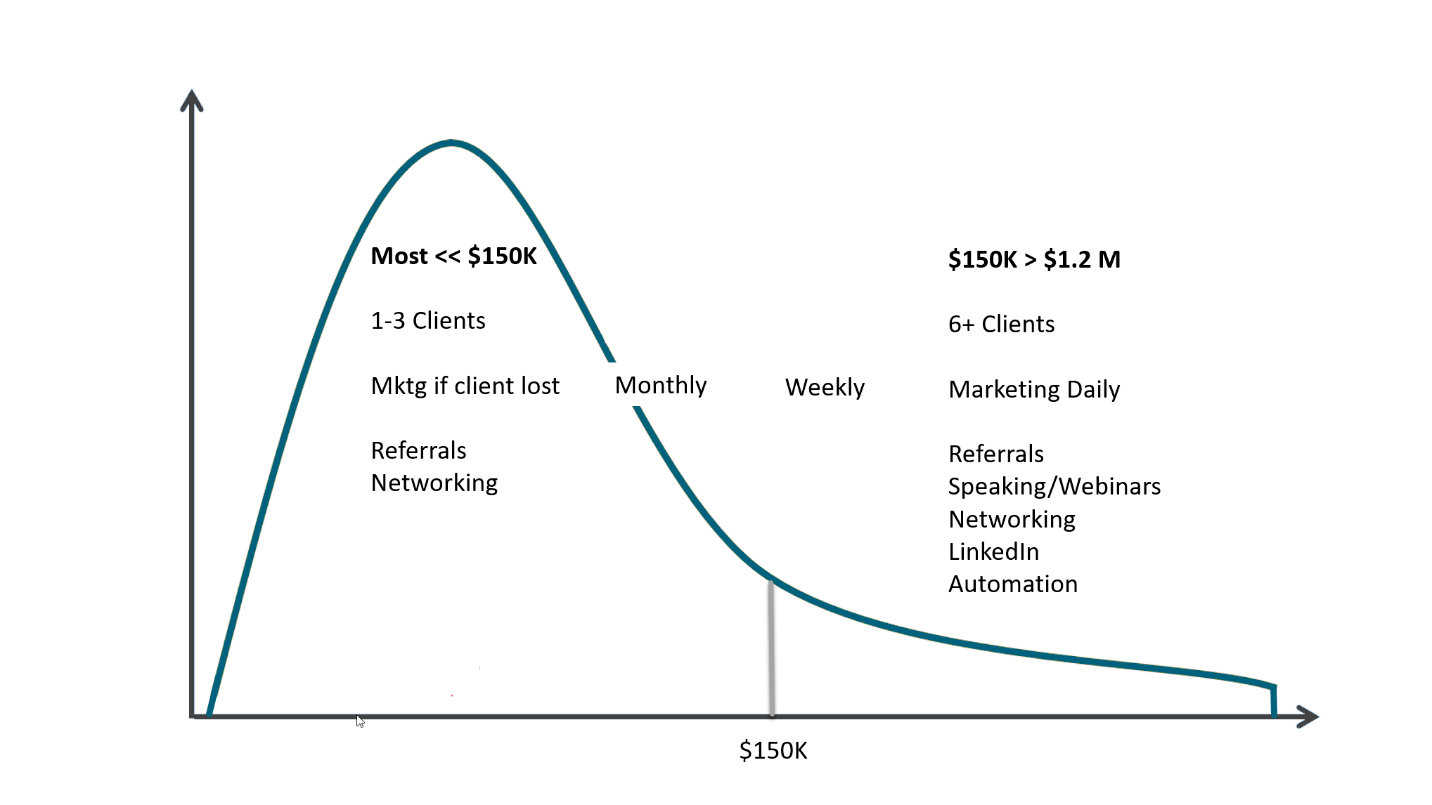
Those earning less than $150,000 per year had only 1 to 3 clients per year, apparently marketing and looking for new clients only when a client was lost. Their marketing primarily depended on referrals and networking.
Consultants earning more than $150,000 per year had six or more clients per year and marketed DAILY. They also used a portfolio of marketing methods that filled their prospect pipeline; referrals, speaking, networking, LinkedIn outreach, seminars, webinars, and email automation.
What Do Consultants Do?
Consultants work in a wide array of fields ranging from helping small retail businesses to researching artificial intelligence and from social media strategist to Global 1000 corporate strategy.
Consultants work in every industry and with every sized business.
A 2017 State of the Industry survey by the Institute of Management Consultants found their US members self-selected themselves into these consulting practice categories,
- Strategy 51%
- Marketing 19%
- Operations 9%
- Financial 6%
- HR 7%
- IT 2%
- Other 1% or less
Institute of Management Consultants, State of Industry, 2017
Consultants work in every industry and with every sized business.
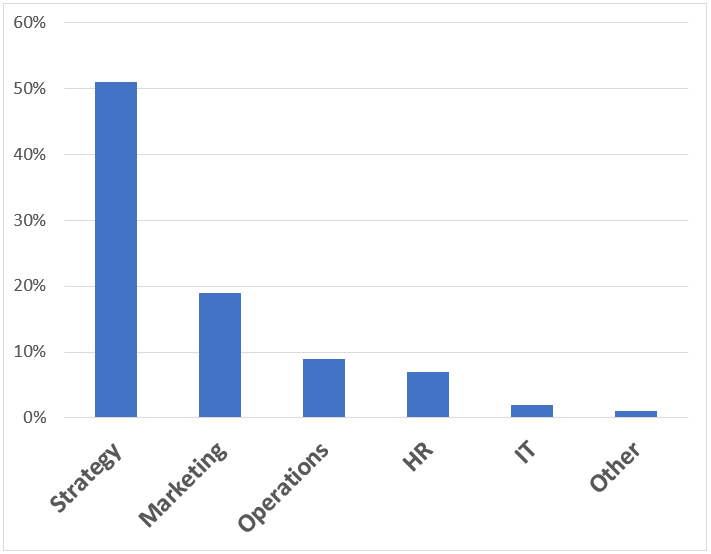
Types of Consulting Services

As the consulting industry has evolved, it has branched out into various types of consulting services, each catering to specific needs of businesses and technology. Some of the most common types of consulting services include:
-
Management consulting
-
Business strategy consulting
-
Financial consulting
-
IT consulting
-
Human resources consulting
-
Marketing consulting
-
Operations consulting
To better understand some of the value that different types of consultants bring to their clients, here are short descriptions of some of the larger categories of consultants.
Remember, within each of these broad categories there are specialized niches that are segmented vertically by industry, for example agriculture, and segmented horizontally by a business or technical specialty, like financial auditing. In most cases highly successful consutants work at the intersection of both a vertical industry and a horizontal specialty, for example, financial auditing in the wine industry.
Business Strategy Consultant
In the fast-paced world of business and technology, it’s critical to stay ahead of the curve. This is where business strategy consultants come into play. They help companies define their over arching business goals, their critical objectives, competitive position, and more.
Business strategy consultants help businesses:
-
Identify and plan a businesses future directions and objectives
-
Adapt to changing market conditions
-
Identify new growth opportunities
-
Develop effective strategies
-
Define and build competitive advantage
-
Meet customer's changing needs
-
Define corporate culture
By partnering with business strategy consultants, companies can adapt and stay competitive in today’s dynamic business environment.
The services provided by business strategy consultants are broad and high level. They help the executive and division teams plot a clear vision to the future.
Financial Consultant
Financial consultants play a pivotal role in guiding companies and individuals by providing expert advice and planning services in areas including investment strategy, insurance options, and corporate financial management.
Beyond core advisory services, management consultants offer specialized services such as financial diagnostics to benchmark performance against industry standards and enhancement of finance functions to bolster strategic decision-making. Their insights foster profitable growth, organizational rethinking, and management of complex business issues that could hinder development or introduce unforeseen risks.
IT Consultant
In this age of digital transformation, IT consultants have become indispensable. They help the organization reach strategic objectives with technology initiatives, employ artificial intelligence, enhance cybersecurity, and automate business workflows.
During the service onboarding process, IT consultants:
-
Organize orientation meetings and service handoffs
-
Provide tailored client manuals
-
Discuss findings
-
Fine-tune support procedures to the business’s specific requirements
This ensures that the technology initiatives are in sync with the strategic objectives of the company.
Marketing Consultant
Marketing consultants help businesses understand their audience, enhance brand visibility, and increase sales. They navigate the complex landscape of marketing channels and consumer behavior to craft campaigns that resonate with target demographics.
Marketing consultants assist businesses with:
-
Conducting market research to gather insights about customer preferences and behaviors
-
Developing marketing strategies and plans to reach potential customers effectively
-
Crafting brand messaging that aligns with the company's values and appeals to its audience
-
Utilizing digital marketing tools and platforms to optimize online presence and engagement
-
Analyzing data to measure the effectiveness of marketing campaigns and adjust tactics accordingly
By engaging with marketing consultants, companies can leverage specialized expertise to refine their marketing efforts, ensuring they communicate the right message, through the right channels, to the right people.
Human Resources Consultant
Human resources consulting specializes in providing guidance on the management of an organization's workforce. These consultants are adept at navigating the complexities of employment law, organizational behavior, and employee relations. They are often called upon to assist with the development and implementation of policies and practices that enhance employee satisfaction and productivity, which in turn can lead to improved business performance.
Human resources consultants work with companies to:
-
Align HR strategies with business objectives
-
Develop and refine employee recruitment processes
-
Create effective onboarding and training programs
-
Implement performance management systems
-
Advise on compensation and benefits planning
-
Support with labor law compliance and risk management
-
Facilitate organizational change and development
-
Enhance workplace diversity and inclusion
-
Provide conflict resolution strategies and mediation
-
Offer guidance on employee retention and engagement
By engaging with human resources consultants, organizations can benefit from their expertise in creating a work environment that not only attracts but also retains top talent while fostering a culture that matches the companies vision and ethics.
Operations Consultant
Operations consulting is a branch of management consulting that focuses on improving the efficiency and effectiveness of a company's operations. Operations consultants take a deep dive into the day-to-day activities that drive an organization, with the goal of enhancing overall performance and achieving operational excellence.
Operations consultants work with businesses to:
-
Streamline processes to reduce costs and eliminate waste
-
Implement lean manufacturing principles and practices
-
Optimize supply chain management for better inventory control and distribution
-
Improve quality control to ensure product and service excellence
-
Enhance production planning and scheduling to maximize efficiency
-
Conduct operational due diligence during mergers and acquisitions
-
Leverage technology to automate processes and increase productivity
-
Design and implement performance measurement systems
By collaborating with operations consultants, companies can identify bottlenecks, reduce operational complexities, and implement continuous improvement strategies that lead to sustained growth and competitive advantage.
Independent Professionals Have Higher Job Satisfaction
The 2019 MBO Partner’s report shows that full-time independents, not just consultants, have a 69% satisfaction rate with their income. That’s close to the 66% satisfaction rate of full-time employees. So, full-time independents and full-time employees have almost the same job satisfaction rate.
There is a big difference though in the interest in their work. 57% of full-time independents are interested in their work, while only 37% of employees are.
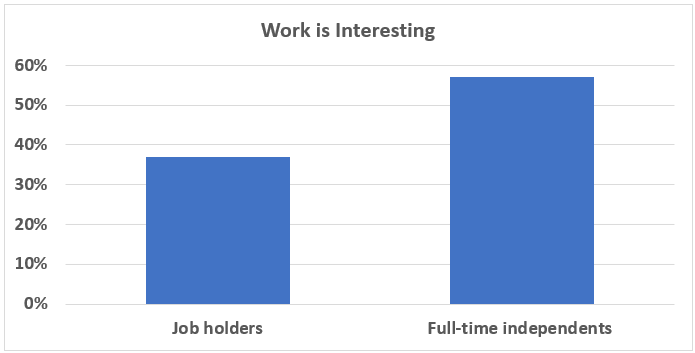
Full-time independents are significantly more interested in their work. This may be because they can,
- Choose clients they prefer
- Work on their own time
- Use their methods
- Maintain their independence
- Build professional credentials
- Earn greater income
This is not a short-term effect. The number of full-time independents planning to continue as independents continues to rise. In 2019, 70% of full-time independents said they plan to continue, up from 64% in 2018 and 58% in 2015.
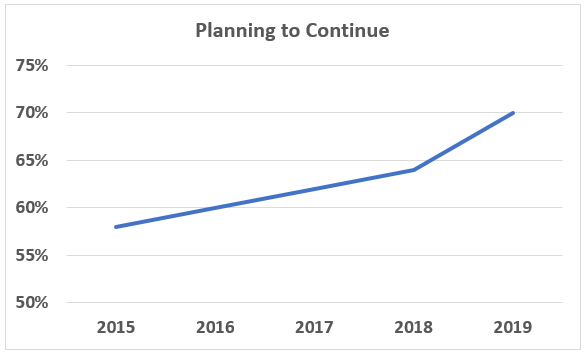
Independent Consultants Have Greater Lifestyle Satisfaction
Research by the London School of Business and the consulting firm Eden McCallum in 2018 showed even greater satisfaction among independent consultants. The vast majority, 90%, of independent consultants are satisfied with their jobs. This is the conclusion from a sample of 307 independent consultants of whom 75% are the main or sole household earner.
A survey by the London Business School found very similar reasons to the results found by MBO Partners,
- The work was more professional and higher impact
- The work was intellectually challenging and rewarding
- They felt greater satisfaction than when they were employed
- They had more control over their time and greater flexibility in work/life balance
This isn’t to say there were no downsides. The downsides independent consultants reported where,
- Large swings in income (feast-or-famine cycle)
- No major brand supporting them
- Lack of employee benefits
What About the Consulting Lifestyle?
The percentage of people working as consultants, business coaches, and full-time freelancers is growing rapidly. The reasons for this growth are more than just high incomes. It’s because a large majority of consultants, independent professionals, and freelancers love what they do and are highly satisfied with their work.
Multiple surveys over the last few years have shown that independent workers are more satisfied, happier, and healthier than their 9-to-5 counterparts. The results from MBO Partners, the Institute of Management Consultants, and the London School of Business all show the same result, greater job satisfaction, career growth, and independence.
With that many solo professionals loving their lifestyle, you can expect the independent workforce to continue growing. Wage stagnation is another good reason to go independent, but more than income people want to work independently for greater personal freedom and greater work satisfaction.

One great advantage of independent consulting is being able to combine work and travel with your family. This picture is from a Viking cruise with my family as we went through a lock on the Rhine River going from Basel, Switzerland to Amsterdam, Netherlands.
The Biggest Complaints of Independent Consultants
Two downsides to independent consulting are a usual topic in any late-night conversation between consultants: the Feast-or-Famine cycle and a lack of recurring revenue to fill gaps.
Undoubtedly, the Feast-or-Famine cycle that drives capricious income is the biggest complaint among independents. I’ve been hearing it continuously in my 30+ years of working with consultants.
The Feast-or-Famine cycle happens because most consultants don’t build marketing systems that automatically fill their pipeline.
A lack of recurring revenue is part of the same theme. Consultants often work long hours improving client businesses, but they do not work on their business. You’ve probably heard it before – you need to work on your business, not just in your business. This problem usually comes from not having multiple streams of recurring income.
You need to work on your business, not just in your business.
Consultants are hard workers, but there are only so many hours you can work. As a solo consultant, you can only earn so much and promote your consulting so widely in the few hours you have.
Smart consultants identify key offerings they can leverage ing their niche. They package or productize their consulting offering so they have multiple streams of income that don't depend upon them putting in client hours.
This guide and the course are here to show you how to avoid these two risks and build your own thriving consulting business.
Skills and Qualifications for a Successful Independent Consultant
A successful independent consultant requires a blend of education, certifications, and interpersonal skills in their niche. They also know how to build a business or they use courses and mentors to build the business skills they lack.
In the consulting industry, having highly qualified university education is valuable, but clients depend just as much on the experience and expertise of a consultant. However, academic qualifications and hands-on experience alone are not enough to excel as a consultant. You also need to have soft skills, such as effective communication, active listening, and emotional intelligence.
Education and Certifications
Before venturing into the consulting job market, it is important to have a combination of academic qualifications and hands-on experience. Pursuing higher education like a Master’s in management can lay a strong business foundation essential for a consulting career.
Not only does obtaining the necessary education and certifications emphasize your expertise, but it also enhances your credibility in the consulting field. Certified consultants often gain access to exclusive communities, events, and job platforms, which can lead to financially rewarding engagements and career advancement opportunities.
Soft Skills You Need as an Independent Consultant
In addition to the necessary education and certifications, having effective soft skills and emotional intelligence is crucial for a successful career in consulting. These skills are critical to effectively implementing a consultants recommendations to executives, colleagues, work teams, and stakeholders.
Active listening and insightful questions are crucial for understanding client needs and translating them into actionable advice. Also, nonverbal communication and feedback skills are important for making sure objectives and messages are understood and implemented.
Great consultants are as good with their human skills as they are with their technical and business skills.
Summary
Consulting offers a promising and rewarding career path for professionals with the right set of skills and qualifications. From guiding businesses towards their goals to helping them adapt to change and uncertainty, consultants play a crucial role in the success of all organizations.
Consulting is an exciting career that can give you higher income, greater independence, and more impact.
Related Links
Link
Frequently Asked Questions
Do you need a degree for consulting?
To become a consultant, you typically need at least a bachelor's degree in business management, marketing, accounting, or finance.
Clients may prefer consultants with a master's degree, especially an MBA, for certain management, finance, or marketing skills.
However, in operations, that degree can be superseded by experience and certification from an industry association.
Most critical in all cases is that you have the experience and authority to show you can do the work. Personal referrals, testimonials, case studies, and white papers carry a greater weight than a degree.
How do consultants make money?
New consultants often charge an hourly or daily rate. As soon as possible you must move away from hourly or daily fees. They limit your earnings and size of projects and clients. Please read the section on setting fees and business models.
The majority of consultants charge on a per-project fee. Consultants also charge for recurring support by signing clients to a retainer.
Once you have a brand with authority and you take on high-value projects, you may want to charge value-based fees. These fees have a flat fee as a base and then an additional fee earned for the added value the consultant has contributed to the client.
What is the role of a consultant?
Consultants are key in providing expert advice and guidance to organizations, helping them improve performance and achieve their business goals. They work closely with clients to address specific needs and offer solutions in various areas of expertise.
Often, there is confusion about the work that freelancers and consultants do. Freelancers work on specific tasks, usually at the client's site and under the client's direction. Consultants give advice, may work on-site or remotely, and work under their direction.
Consultants appear to charge more than full-time employees (FTE), but they are usually more cost-effective than full-time employees. The "hidden" costs for an employer paying an FTE include health benefits, Social Security taxes, vacation time, educational and seminar expenses, and many more.
Why do companies hire consultants?
Companies hire consultants for their specialized expertise, objective perspective, flexibility of not being full-time, and cost-effectiveness, helping them to address specific challenges and make informed decisions.

